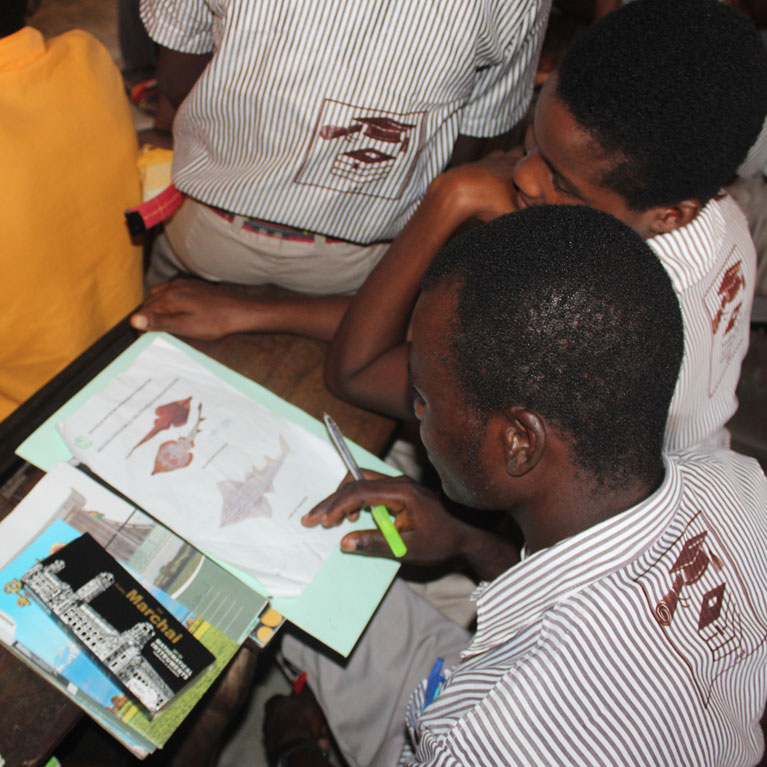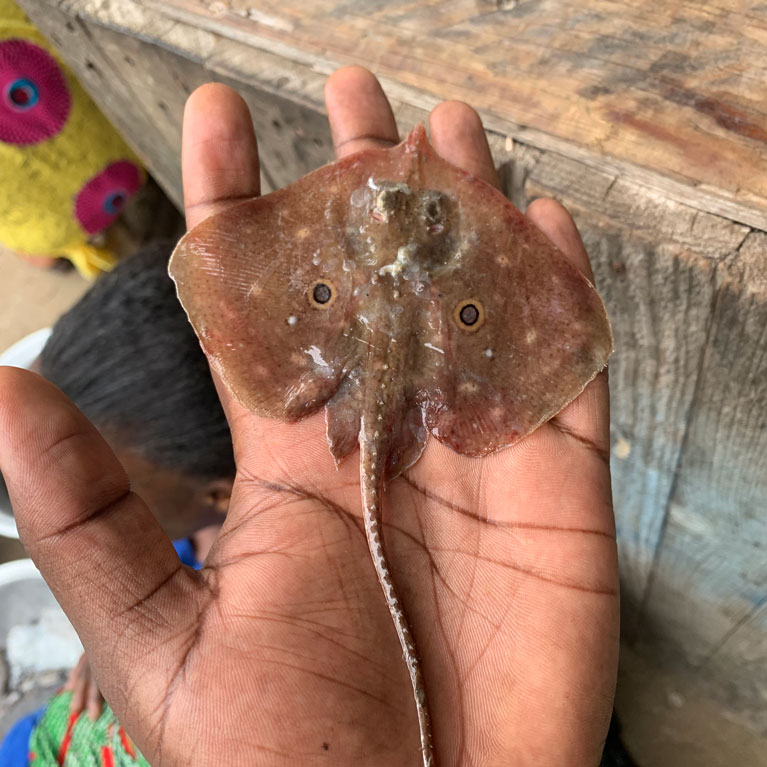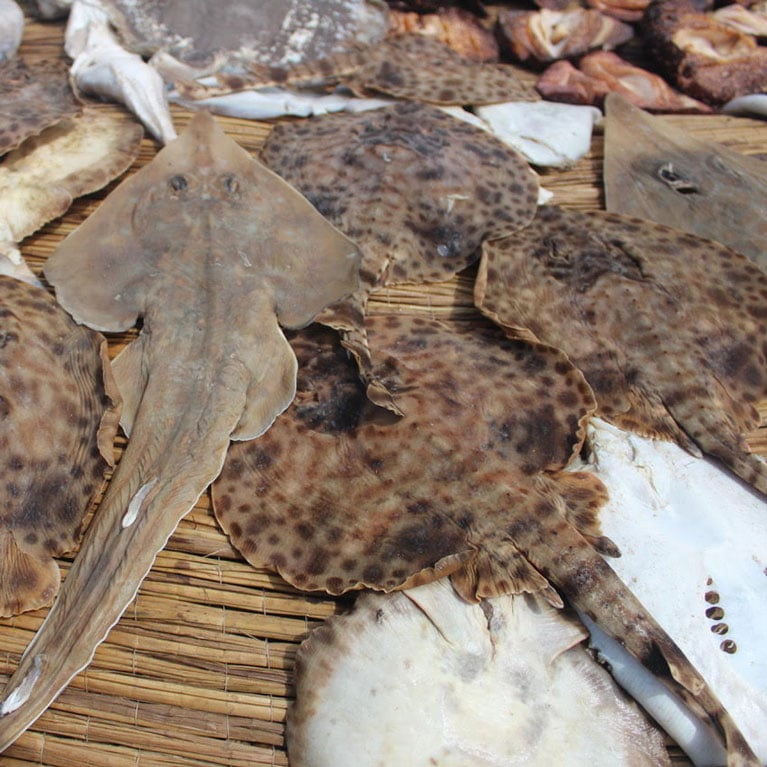Protecting the African wedgefish in Ghana
The Critically Endangered African wedgefish comes with a string of alarming conservation titles: it’s an evolutionarily distinct and globally endangered animal (EDGE) and listed on CITES Appendix II. But in Ghana, where overfishing in the coastal waters in which this ray is predicted to range, precious little is currently known about the African wedgefish. Bernard is aiming to change that by collecting novel information on its population, catches, how it is traded and what its socio-economic value is. The information, he hopes, will help drive a much-needed conservation plan to ensure that, with adequate management, this wedgefish doesn’t disappear from Ghana’s waters.
I am an up-and-coming marine biologist and conservationist with a focus on rays in Ghana. My career goal is to develop research and conservation programmes geared toward the long-term survival and persistence of rays and sharks in Ghana and West Africa. My parents came from coastal villages in Ghana and I have been fascinated by the biodiversity of the ocean since childhood. I visited my parents’ home villages regularly and enjoyed the delicacies that came from the sea. However, I was not aware of the detrimental impacts of our actions until I specialised in wildlife and range management...



Urgent Conservation and Population Assessment of the African Wedgefish in Ghana.
The key objective of the project is to provide new and comprehensive data on the population, harvest, trade and socio-economic significance of the African wedgefish so that an action plan to ensure its conservation and persistence in Ghana can be developed. The project will also raise awareness about the conservation of the species and educate fishers about fisheries regulations to help reduce the exploitation of the species.
The project is crucial to the conservation of the African wedgefish, as it will provide significant data on the species’ population, biology, socio-economic relevance and trade, as well as threats to it. These data will help to develop pragmatic interventions and management strategies to safeguard this wedgefish from extinction and protect its habitat. In addition, the data will be used to develop sustainable measures to regulate the exploitation of marine resources for posterity.
The African wedgefish is a globally endangered and evolutionarily distinct marine organism. It is the only species of the family Rhinidae that occurs in West Africa. Its IUCN Red List classification as Critically Endangered and its presence on Appendix II of CITES indicate the urgent need for its conservation and the protection of its habitat. The species’ population has decreased by 90% over the past three generations owing to the high demand for its fins for the international shark fin trade, unregulated fishing activities within its range, and coastal communities’ high demand for protein. Moreover, this alarming decline is due to heavy exploitation by industrial, artisanal and subsistence fisheries, which points to high socio-economic dependency on the species. Fishing resources within West Africa are overexploited, resulting in the depletion of food sources and destruction of the wedgefish’s coastal and shelf habitats. Ghana’s coastal waters fall within its range and it is known to persist here. However, unregulated fishing operations and overexploitation are increasing the risks of it going extinct. Moreover, inadequate research and conservation efforts in Ghana – judging by the lack of time-series data and conservation advocacy programmes – weaken the development and implementation of interventions to safeguard the survival of the species. Therefore, the urgent need to assess its population status, threats and the effects of trade on it cannot be overstated. Following IUCN recommendations, key data from this project will be used to develop a conservation action plan that will ensure the population recovery of the African wedgefish and its long-term persistence in Ghana.
The overall aim of the project is to provide the vital scientific data required to develop the means to avert the extinction of the African wedgefish in Ghana. The project’s objectives are:
- To provide the significant data needed to develop an action plan for the wedgefish’s conservation by assessing its population, the harvesting of it and the trade in it.
- To help reduce the exploitation of the wedgefish by creating awareness of the need to conserve it and by educating fishers about fisheries regulations relating to it within the study area. Increasing the awareness of community members about the species’ plight will help create a positive change in attitude to its conservation, while increasing fishers’ knowledge of fisheries regulations will increase their adherence to the regulations and reduce overexploitation of the species and marine resources in general. These two factors will lead to a long-lasting effort to do whatever is necessary to conserve the African wedgefish over the long term.
Summary of main research results/outcomes:
The project carried out along the East Dangme Coastline uncovered a significant variety of ray species, identifying ten in total, which included four classified as Critically Endangered, one as Endangered, four as Near Threatened, and one as Least Concern according to the IUCN Red List classifications. Although no specimens of the African Wedgefish were documented during the landing surveys, local fishers confirmed sporadic captures. The presence of large bodied guitarfishes (Rhinobatidae), underscores the ecological significance of the region since these are also highly threatened species. The study revealed unregulated and indiscriminate fishing methods, such as the use of modified drift gillnets and a lack of size or seasonal restrictions. Socioeconomic evaluations showed the heavy dependency on ray fisheries for sustenance and income, which is excerbated by the international fin trade. In spite of these challenges, the project effectively raised awareness, involved stakeholders, and initiated positive changes in fishing practices, establishing a foundation for long-term community-supported conservation efforts for rays.

